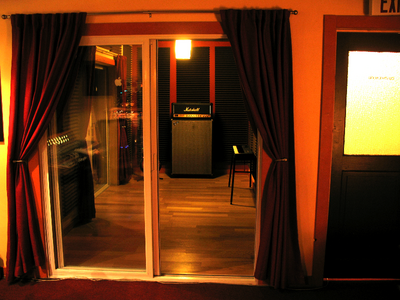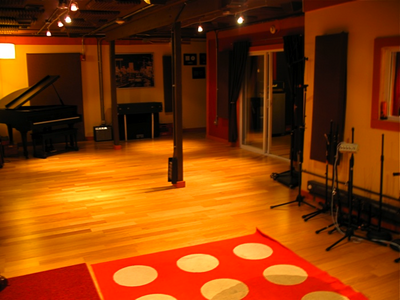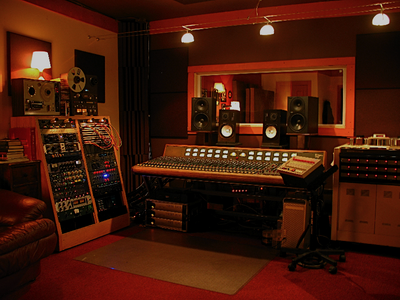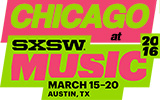| « Taking a Tumble with Black Dice | A Warmup to B-LIVE » |
Feature Thu May 21 2009
Brian Zieske's Gallery of Carpet
The deeper I delve into the Chicago music scene the more fascinated I become with all of the various aspect of our self-contained industry. From the bands, to the venues, to the labels, to the recording studios, and even the duplication services, all aspects are represented in our city. A studio that has worked with some of the best up-and-coming acts around the city is Gallery of Carpet. Their client base includes the likes of Snowsera, Bailiff, Pet Lions, Color Radio, Sars Flannery, The Academy is...,The Hush Sound, The Rikters, and many more. I recently had the pleasure of chatting with the producer/engineer and owner of Gallery of Carpet, Brian Zieske.
Gapers Block: What prompted to you start your own recording studio?
Brian Zieske: I started recording my own band over 13 years ago when I was in high school around 1996. I was really into the concept of documenting a music performance live and manipulating it later to enhance or color the tone. I started with a basic dual deck cassette tape karaoke machine and some really crappy plastic toy microphones. I would then playback the recorded performance and record on the other deck while performing through the mike. This would combine the recorded track with the additional overdub. This process then became more and more complex. I must have had 15 "Y" adapters going in order to increase the number of microphones I could use on the drums. I eventually purchased a digital 8-track recorder, which used the failed Mini-Disc Data format and sounded thin and nasty. I started recording other local bands and producing their Eps and continued to purchase new gear. I graduated Columbia College Chicago a few years later and helped break the Academy is... to Fueled by Ramen producing and recording their debut Ep at various studios and in the basement. This was the start to my professional career as a producer, engineer, mixer and studio owner. The Emo explosion in Chicago was very lucrative and I began investing in high quality analog gear that I planned on owning for the rest of my career. Business was exploding and it was time to move out of the basement. At this point I chose my current studio's location.
GB: What type of steps do you have to take to turn a gym-like facility into a studio?
BZ: The location was pretty raw, it was built as a movie theatre in the early 1900's. Later it was renovated to be a YMCA gymnasium and eventually a roller rink. When I moved in it was a very raw ware house office space. I tore open the walls and insulated them as well as replaced all the electrical in order to be properly grounded and up to code. I built isolating walls within the space to create separate rooms for the control room and live rooms as well as various isolation booths and a lounge. I had to re-floor the entire facility and put in new ceilings as well. Then I painted, put up lights and strategically placed acoustic paneling to balance the live room acoustics. I also balance the control room acoustics to help give me a "flat" response in the listening position located directly in front of the board. This took me about 2 months of construction time before I was able to start working.
GB: What role does the engineer play in forming a bands studio sound?
BZ: A music recording engineer is closely involved in the creative technical aspects of how an artist's desired sound be recorded to the analog or digital medium. For example if the artist wants a dark, and spacious sound I would translate that into tone using the tools at hand, tone knobs, Eq, mics, instruments, etc. Drawing from experience I would choose the tools that would best suite the artists requirements. Sometimes this requires experimentation and further manipulation. An engineer will use all of his tools, skills and experience to manipulate the recording process in order to achieve the sonic and aural vision of the artist. There are many ways to manipulate audio within the studio setting starting with microphone placement all the way through mixing and mastering.
GB: I hear it all the time, a band is trying to capture their live sound or their live energy. How do you typically work with a band like that?
BZ: Live music is performed by humans playing individual instruments together. I found that recording music live in the studio is the most exciting way to capture a performance. There are many ways to go about this as it all depends on the artist's vision. I can isolate the amplifiers and instruments in any of my three booths. This allows me to capture each instrument cleanly while the band performs together in the live room with the drummer. This is a great way to pound out a recording, as you can punch in individual instruments and not effect the other musician's performance. This core live foundation has much more synergy than if you record individual tracks one at a time. Another option to recording live is to place all the amps in the same room as the drums and let the instruments bleed into each other's microphones. This can create amazing results as well, creating a very three dimensional sound. Each project is a unique challenge and requires a unique approach to achieve the best results. I love to experiment and force limitations to create unique tones and recordings. Sometimes I am not able to record live and have to layer overdubs, the goal still is to create recording that is alive and human. Limitations force creativity.
GB: You briefly touch on it on you website, but what is the difference in the roles of a produce vs an engineer?
BZ: I like to keep this one simple. Engineers are audio technicians focusing on the tones, colors, and audio documentation. Producers are music technicians focusing the artist's musical vision, performance, arrangement, songs etc. I believe there are 2 types of producers. There are the old school Phil Spector types who do not know or care to know about the engineering aspect of recording music, they write, arrange, compose, and inspire the artist to perform like a legend. And there are producers who are also engineers. With project budgets always shrinking the old school producers have become a dying breed.
GB: I know you work with all types of music, but is there a sound that is easier to work with?
BZ: I really love working with all types of music, there is something universal about music that crosses over through all genres. I love music that is performed with emotion and dynamics. I love rhythm that brings a tap to my toe, a swing to my stride, a skip to my step, stomp to the ground or a bump to my hump. Melody is what takes my ear colors lyrics. Harmony can give me goosebumps. I tend to like music that has it's own attitude, I like music that uses dynamics to create an emotional response. I like hearing music that is human, being human is not "perfect" and this is why I can connect to it. The easiest music to work with would have to be rock, its usually the same formula, drums, bass, guitars, vocals, maybe keys. Rock music is loud and punchy, and should be played with attitude. It would be awesome to record a Paul McCartney record, Radio Head or Wilco one day. Its ok to dream, right?
GB: What does it mean to you personally to see an album you worked on find success?
BZ: I like it and wish some of the less known artists I worked with found success. The music industry is a strange place, I understand now why it is failing. Many labels have lost sight of the art in music, and an entire generation doesn't understand fidelity and think mp3s are quality audio.
GB: Are there any big plans for the studio in the near future?
BZ: I am looking into relocating to Nashville. There is a thriving indie rock scene that appeals to me and a successful music industry to boot. The cost of living is much less than in Chicago as well. I hope to connect Chicago and Nashville somehow. Whatever I do I plan on making records, its what I do.
For more information on Gallery of Carpet please visit their website.



















Brian / August 23, 2009 9:12 PM
GoC is one of Chicago's Top 5 in 2009!
http://www.examiner.com/x-427-Chicago-Rock-Music-Examiner~y2009m8d3-Five-great-recording-studios-in-Chicago